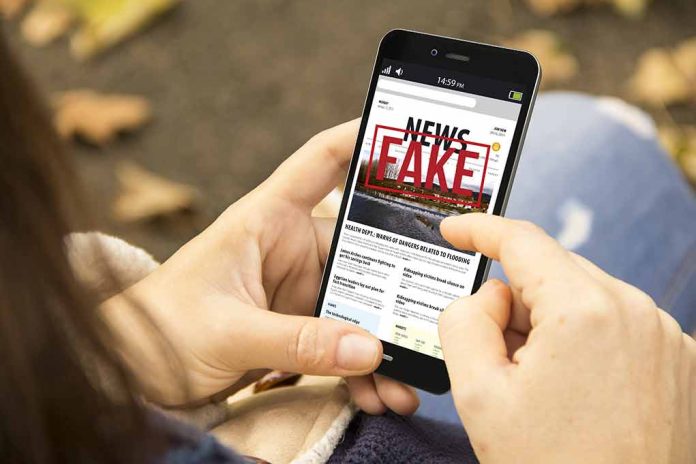
President Trump calls for CNN reporter Natasha Bertrand’s immediate firing over alleged “Fake News” about Iran strikes, highlighting her pattern of reporting that critics say damages American interests and promotes partisan narratives.
Key Takeaways
- President Trump demanded CNN fire correspondent Natasha Bertrand for reporting that recent strikes on Iranian nuclear sites only set back Tehran’s program by a few months, calling it “Fake News” that damages U.S. pilots’ reputation.
- Bertrand has a history of controversial reporting, including her 2020 Politico story suggesting Hunter Biden’s laptop controversy could be Russian disinformation, which was later debunked.
- CNN has defended Bertrand, stating they “stand 100% behind” her reporting while acknowledging it was based on an initial intelligence assessment.
- The dispute highlights growing tensions between the Trump administration and mainstream media outlets over national security reporting and media bias.
- Critics argue Bertrand’s work demonstrates a pattern of targeting political adversaries without substantial evidence to support specific partisan narratives.
Trump’s Scathing Critique of CNN’s Iran Strike Coverage
President Trump launched a blistering attack against CNN correspondent Natasha Bertrand after she reported that U.S. intelligence found recent strikes on Iranian nuclear sites only delayed Tehran’s nuclear program by a few months. This directly contradicted the administration’s position that the strikes “totally destroyed” the nuclear sites. Trump’s criticism went beyond simple disagreement with the reporting, targeting Bertrand personally and calling for her termination from CNN. The dispute centers on classified intelligence assessments about a critical national security operation, with Trump arguing that leaking preliminary reports undermines both the administration’s strategy and the exceptional work of American military personnel.
“Natasha Bertrand should be FIRED from CNN! I watched her for three days doing Fake News. She should be IMMEDIATELY reprimanded, and then thrown out ‘like a dog’,” said Donald Trump.
The president specifically highlighted that Bertrand’s reporting damages the reputation of U.S. pilots who conducted the precision strikes. Trump called the preliminary classified report incomplete and criticized the leak of what should be confidential assessments. This incident marks a significant escalation in the ongoing tension between the Trump administration and CNN, as the president explicitly called for personnel changes at the network, stating that Bertrand “should not be allowed to work at Fake News CNN” based on her reporting practices.
Bertrand’s History of Controversial Reporting
Critics point to Bertrand’s reporting history as evidence of what they view as a pattern of bias. Most notably, Trump referenced Bertrand’s 2020 Politico story suggesting the Hunter Biden laptop controversy could be Russian disinformation – a claim later proven false as the laptop’s authenticity was verified. This reporting effectively helped suppress a major story that could have damaged then-candidate Biden’s campaign. Conservative media have argued this represents a concerning trend in Bertrand’s work, where reporting appears selectively framed to benefit certain political interests while targeting opponents with thinly-sourced accusations.
“She lied on the Laptop from Hell Story, and now she lied on the Nuclear Sites Story, attempting to destroy our Patriot Pilots by making them look bad when, in fact, they did a GREAT job and hit ‘pay dirt’ — TOTAL OBLITERATION!” said Donald Trump.
Bertrand joined CNN in April 2021 after previously covering national security and politics for Politico, The Atlantic, and Business Insider. Throughout her career, critics have questioned whether her reporting meets journalistic standards for objectivity and evidence-based reporting. The recurring criticism focuses on allegations that her work demonstrates a persistent bias targeting political adversaries without substantial evidence, allegedly to support partisan narratives. Such concerns raise broader questions about media integrity and the potentially damaging impact of biased reporting on public discourse and national security.
CNN’s Defense and Media Accountability Questions
CNN has vigorously defended Bertrand against the president’s criticisms, with the network’s PR team stating: “We stand 100% behind Natasha Bertrand’s journalism and specifically her and her colleagues’ reporting of the U.S. attack on Iran’s nuclear facilities.” The network emphasized that their reporting made clear the assessment was preliminary and could change with additional intelligence gathering. However, this defense fails to address the broader pattern of reporting that critics argue shows consistent partisan bias. The controversy raises important questions about journalistic ethics, media accountability, and the responsibility news organizations have to ensure their reporting is balanced, fair, and not damaging to national interests.
“CNN’s reporting made clear that this was an initial finding that could change with additional intelligence,” said a CNN spokesperson.
This incident occurs as CNN reportedly attempts to neutralize its coverage of the Trump administration while simultaneously facing increased criticism from the president. Beyond Bertrand, Trump has recently targeted other CNN figures, including Anderson Cooper, and media organizations like Comcast and ABC News. The ongoing tension highlights the complex relationship between the administration and the press, with fundamental disagreements about what constitutes accurate, fair reporting versus what the president considers “Fake News” designed to undermine his administration’s accomplishments and national security initiatives.




